Table of Contents Show
Prayer, an essential aspect of many religious and spiritual practices, is often regarded as a profound means of seeking solace, guidance, and spiritual connection. However, despite its significance, many individuals encounter various difficulties in establishing and sustaining a regular prayer routine. Understanding the reasons behind the struggle to pray is crucial in addressing these challenges and fostering a more profound connection with one’s spirituality.
This comprehensive guide studies the underlying factors that contribute to the complexities of prayer and offers practical solutions to overcome these obstacles.
Why Is It Hard To Pray
Engaging in prayer often involves a complex interplay of emotional, psychological, and spiritual elements. Various internal and external factors contribute to the challenges individuals face in maintaining a consistent and meaningful prayer practice. These obstacles can range from psychological struggles, such as doubt and distraction, to external pressures and time constraints. Understanding these challenges is crucial in devising effective strategies to overcome them and foster a deeper connection with one’s spirituality.
Unveiling the Challenges of Prayer
Prayer, an act embedded in various spiritual and religious practices, is often regarded as a source of solace and guidance. It serves as a means to connect with a higher power, seeking blessings, peace, and clarity. However, despite its profound significance, many individuals encounter difficulties when trying to establish a regular prayer routine. Understanding the factors that make it hard to engage in meaningful prayer is crucial for anyone seeking to deepen their spiritual practice and find comfort in their faith.
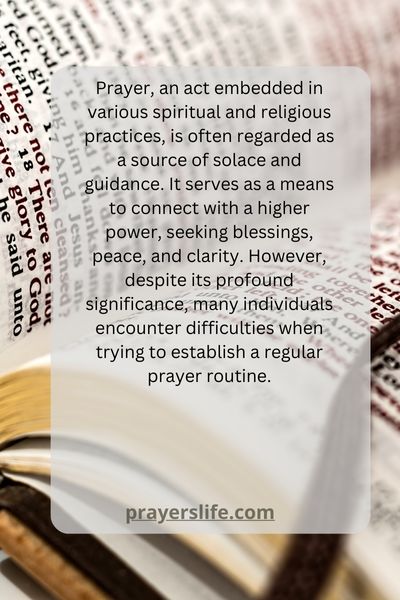
Understanding the Internal Struggles
The Tug of Distractions and Mundane 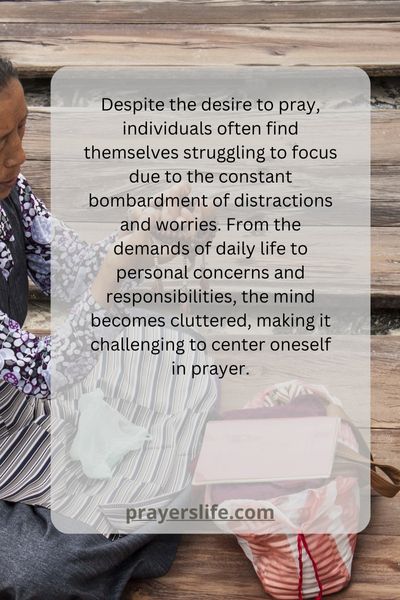
Despite the desire to pray, individuals often find themselves struggling to focus due to the constant bombardment of distractions and worries. From the demands of daily life to personal concerns and responsibilities, the mind becomes cluttered, making it challenging to center oneself in prayer.
Emotional Turmoil and Inner Conflict
Emotional turbulence and internal conflicts can significantly impede the ability to pray. Unresolved emotions, such as anger, grief, or resentment, can create barriers, making it difficult to connect with spiritual energies and find solace in prayer.
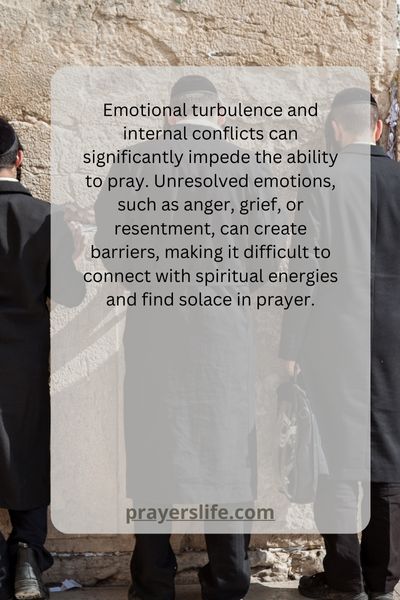
The Struggle of Doubt and Faith
A persistent battle between doubt and faith can pose a significant challenge in maintaining a consistent prayer routine. Uncertainties about the effectiveness of prayer or questioning one’s beliefs can lead to a sense of disconnection, hindering the ability to engage with the practice wholeheartedly.
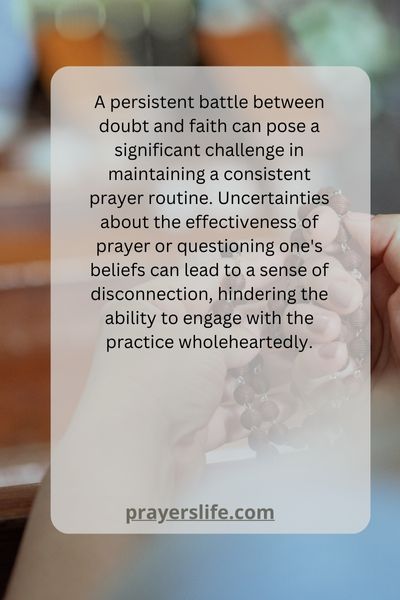
Lack of Faith or Spiritual Connection
Some individuals may struggle to pray due to a lack of faith or a diminished sense of spiritual connection. Doubt, skepticism, or a feeling of disconnect from a higher power can make prayer feel meaningless or insincere. Without a genuine belief in the efficacy of prayer, it becomes challenging to cultivate the necessary devotion and commitment required for regular practice.
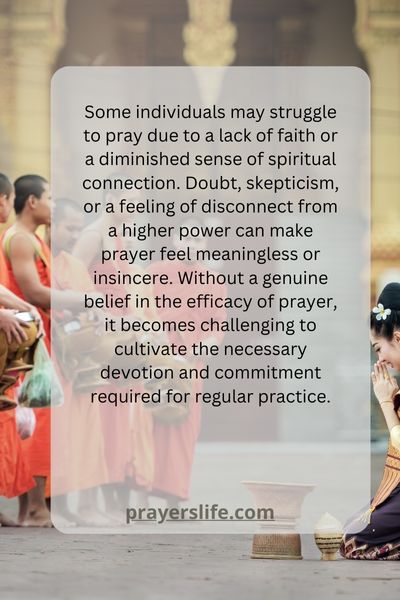
External Factors Impacting Prayer Practices
Influence of Surrounding Environment and Community
The impact of the environment and community dynamics can affect one’s prayer practice. A lack of supportive surroundings or the absence of a like-minded community can create feelings of isolation and disconnection, making it harder to sustain a regular prayer routine.
Cultural and Societal Pressures
Cultural and societal expectations can exert pressure on individuals, shaping their perspectives on prayer. These pressures may lead to feelings of inadequacy or the fear of judgment, affecting the individual’s comfort level and willingness to pray openly and sincerely.
Time Constraints and Busy Schedules
In today’s fast-paced world, time constraints and demanding schedules can pose a significant obstacle to consistent prayer. Juggling multiple responsibilities and commitments often leaves little room for introspection and spiritual engagement, making it hard to prioritize prayer amidst the hustle and bustle of daily life.
Distractions and Busy Lifestyles
In the contemporary world, individuals often find themselves engrossed in hectic schedules and a multitude of responsibilities. Balancing work, family, social commitments, and personal pursuits can make it difficult to find dedicated time for prayer. Constant distractions, such as technology, social media, and the demands of modern living, can further impede one’s ability to focus and engage in meaningful prayer.
Overcoming the Challenges Through Mindful Approaches
Cultivating Mindfulness and Meditation Practices
Incorporating mindfulness and meditation practices can help alleviate distractions and emotional turmoil, fostering a more focused and peaceful state of mind conducive to prayer. By cultivating a habit of mindfulness, individuals can gradually overcome internal obstacles and develop a deeper connection with their spiritual selves during prayer.
Building a Supportive Community and Seeking Guidance
Building a supportive community of like-minded individuals and seeking guidance from spiritual mentors can provide the necessary encouragement and support to navigate the challenges of prayer. Sharing experiences and learning from the wisdom of others can offer insights and solutions to overcome personal struggles and strengthen one’s prayer practice.
Creating a Personalized Prayer Routine
Tailoring a personalized prayer routine that aligns with individual preferences and schedules can make the practice more accessible and sustainable. By incorporating flexibility and creativity into the routine, individuals can find a balance that allows them to integrate prayer seamlessly into their daily lives, fostering a more profound spiritual connection.
Perception of Prayer as a Ritual or Obligation
When prayer is perceived as a mere ritual or obligation, rather than a genuine form of communication with a divine presence, it can become burdensome and lose its spiritual essence. This mechanical approach to prayer may lead to feelings of disconnection, apathy, or a lack of personal investment, making it difficult for individuals to find meaning and fulfilment in their practice.
Feeling of Unworthiness or Unanswered Prayers
Individuals who struggle with feelings of unworthiness or who have experienced prolonged periods of unanswered prayers may find it challenging to maintain their faith and motivation to pray. The perception of being unheard or undeserving of divine intervention can lead to feelings of disillusionment and discouragement, causing individuals to distance themselves from the practice of prayer altogether.
Philosophical and Intellectual Obstacles
Some individuals may grapple with philosophical or intellectual dilemmas that challenge the concept of prayer itself. Questions about the nature of a higher power, the validity of religious doctrines, or the existence of a divine presence can create cognitive dissonance and hinder the ability to engage in prayer authentically.
Personal Trauma or Past Negative Experiences
Individuals who have undergone traumatic experiences or have had negative encounters with religious institutions may associate prayer with painful memories or feelings of betrayal. Such associations can lead to a profound aversion to prayer and spirituality, making it difficult for individuals to reconcile their past traumas with the act of prayer.
Lack of Understanding or Guidance
A lack of understanding of the purpose and significance of prayer, as well as the absence of proper guidance or mentorship, can contribute to the difficulty of establishing a consistent prayer practice. Without the necessary knowledge and spiritual nurturing, individuals may feel lost or unsure about how to approach prayer, hindering their ability to form a meaningful and fulfilling connection with their spiritual beliefs.
Conclusion
Amidst the various obstacles that can make prayer challenging, it’s crucial to approach the practice with patience, perseverance, and an open heart. By acknowledging and addressing the internal and external factors hindering prayer, individuals can embark on a journey of self-discovery and spiritual growth, nurturing a deeper connection with their faith and finding solace in the power of prayer.
FAQs
- Is it normal to struggle with prayer? Yes, it’s normal to face challenges in prayer, as it is a deeply personal and introspective practice that can be influenced by various internal and external factors.
- How can I overcome doubt and strengthen my faith during prayer? Engaging in spiritual readings, seeking guidance from mentors, and fostering a sense of community can help individuals navigate doubts and strengthen their faith over time.
- What can I do to stay focused during prayer? Creating a conducive environment, minimizing distractions, and practicing mindfulness techniques can significantly enhance focus and concentration during prayer.








